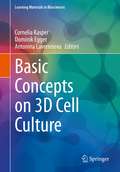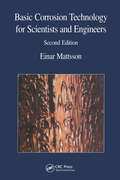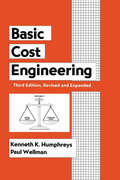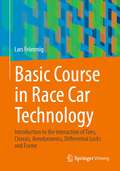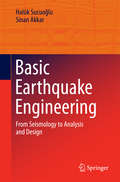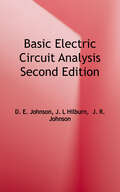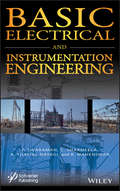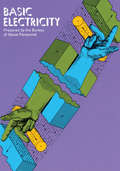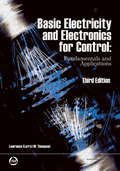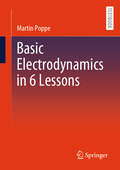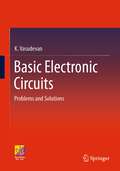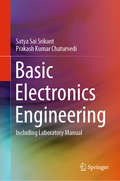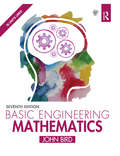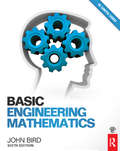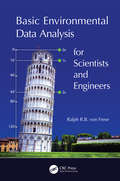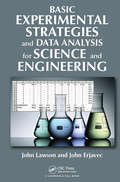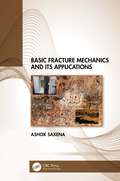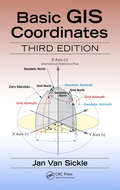- Table View
- List View
Basic Concepts of Environmental Chemistry
by Des W. ConnellBasic Concepts of Environmental Chemistry, Second Edition provides a theoretical basis for the behavior and biological effects of natural chemical entities and contaminants in natural systems, concluding with a practical focus on risk assessment and the environmental management of chemicals. The text uses molecular properties such as pola
Basic Concepts of Industrial Hygiene
by RonaldM. ScottBasic Concepts of Industrial Hygiene covers the latest and most important topics in industrial hygiene today. The textbook begins with a look at the history and basis for industrial hygiene, which provides students with a foundation for understanding later developments. The book contains an in-depth discussion of new OSHA regulations, such as HAZWOPER and Process Safety, which deal with high hazard situations. It also features a chapter on biological hazards of current concern in health care, including tuberculosis, AIDS, and hepatitis B.
Basic Concepts of Iron and Steel Making
by Sujay Kumar Dutta Yakshil B. ChokshiThis book presents the fundamentals of iron and steel making, including the physical chemistry, thermodynamics and key concepts, while also discussing associated problems and solutions. It guides the reader through the production process from start to finish, covers the raw materials, and addresses the types of processes and reactions involved in both conventional and alternative methods. Though primarily intended as a textbook for students of metallurgical engineering, the book will also prove a useful reference for professionals and researchers working in this area.
Basic Concepts on 3D Cell Culture (Learning Materials in Biosciences)
by Cornelia Kasper Antonina Lavrentieva Dominik EggerThis textbook shall introduce the students to 3D cell culture approaches and applications. An overview on existing techniques and equipment is provided and insight into various aspects and challenges that researchers need to consider and face during culture of 3D cells is given. The reader will learn the importance of physiological cell, tissue and organ models and gains important knowledge on 3D analytics. This textbook deepens selected aspects of the textbook “Cell Culture Technology”, which also is published in this series, while offering extended insight into 3D cell culture. The concept of the textbook encompasses various lectures ranging from basics in cell cultivation, tissue engineering, biomaterials and biocompatibility, in vitro test systems and regenerative medicine. The textbook addresses Master- and PhD students interested and/or working in the field of modern cell culture applications and will support the understanding of the essential strategies in 3D cell culture and waken awareness for the potentials and challenges of this application.
Basic Confocal Microscopy
by Robert L. Price W. Gray JeromeBasic Confocal Microscopy, Second Edition builds on the successful first edition by keeping the same format and reflecting relevant changes and recent developments in this still-burgeoning field. This format is based on the Confocal Microscopy Workshop that has been taught by several of the authors for nearly 20 years and remains a popular workshop for gaining basic skills in confocal microscopy. While much of the information concerning fluorescence and confocal microscopy that made the first edition a success has not changed in the six years since the book was first published, confocal imaging is an evolving field and recent advances in detector technology, operating software, tissue preparation and clearing, image analysis, and more have been updated to reflect this. Several of these advances are now considered routine in many laboratories, and others such as super resolution techniques built on confocal technology are becoming widely available.
Basic Corrosion Technology for Scientists and Engineers
by Einar MattssonAn introductory guide covering Basic Corrosion Technology for Scientists and Engineers first published in 1999.
Basic Cost Engineering
by Kenneth K. Humphreys Mike MüllerThis work focuses on the application of fundamental cost engineering principles to the capital and operating costs estimation of major projects. It provides detailed coverage of profitability, risk, and sensitivity analysis. This third edition: discusses novel strategies for calculating preliminary estimates using MasterFormat; presents new information on estimating the retrofitting and extension of existing plants; contains current international cost data; and more.;A solutions manual is available to instructors only.
Basic Course in Race Car Technology: Introduction to the Interaction of Tires, Chassis, Aerodynamics, Differential Locks and Frame
by Lars FrömmigThe focus of the book is on the driving dynamics of racing vehicles. The interaction of the tyre, the aerodynamics, of the chassis and the limited slip differential specific to racing vehicles is dealt with. A chapter on the basics of vehicle dynamics makes it possible to get started with this topic even without prior automotive engineering training. A historical review and a consideration of the essential safety aspects create an understanding of higher-level requirements, which are specified, for example, by the technical regulations.
Basic Earthquake Engineering: From Seismology to Analysis and Design
by Sinan Akkar Halûk SucuoğluThis book provides senior undergraduate students, master students and structural engineers who do not have a background in the field with core knowledge of structural earthquake engineering that will be invaluable in their professional lives. The basics of seismotectonics, including the causes, magnitude, and intensity of earthquakes, are first explained. Then the book introduces basic elements of seismic hazard analysis and presents the concept of a seismic hazard map for use in seismic design. Subsequent chapters cover key aspects of the response analysis of simple systems and building structures to earthquake ground motions, design spectrum, the adoption of seismic analysis procedures in seismic design codes, seismic design principles and seismic design of reinforced concrete structures. Helpful worked examples on seismic analysis of linear, nonlinear and base isolated buildings, earthquake-resistant design of frame and frame-shear wall systems are included, most of which can be solved using a hand calculator.
Basic Electric Circuit Analysis
by D. E. Johnson J. L Hilburn J. R. JohnsonKey equations are followed by a brief explanation to increase student comprehension of important mathematical concepts. Modern op amp is presented as a versatile linear circuit element. Highly motivational use of op amps with SPICE for exploratory active circuit design. SPICE tutorial material placed in clearly marked sections that can be skipped or de-emphasized. No reliance on SPICE or other computer methods in the remaining sections. Balanced emphasis given to the complementary time, phasor, and domain approaches which are the core of modern linear circuit analysis.
Basic Electrical Installation Work 2357 Edition, 6th ed
by Trevor LinsleyThis textbook covers all the material you need to pass the first part of the new City & Guilds 2357 Diploma in Electrotechnical Technology Aligned with the 17th edition IEE Wiring Regulations, this new edition has been thoroughly updated to cover the ‘knowledge’ section of the latest 2357 course. Written in an accessible style and with a separate chapter for each unit, this book helps you to master each topic before moving on to the next. End of chapter revision questions help you to check your understanding and consolidate the key concepts learned in each chapter. With associated online animations and instructional videos to further support your learning, this is the text that no electrical installations student should be without. Also available: Advanced Electrical Installation Work 6th editionTrevor LinsleyISBN: 9780080970424
Basic Electrical Installation Work: City And Guilds Edition
by Trevor LinsleyEverything needed to pass the first part of the City & Guilds 2365 Diploma in Electrical Installations. Basic Electrical Installation Work will be of value to students taking the first year course of an electrical installation apprenticeship, as well as lecturers teaching it. The book provides answers to all of the 2365 syllabus learning outcomes, and one chapter is dedicated to each of the five units in the City & Guilds course. This edition is brought up to date and in line with the 18th Edition of the IET Regulations: It can be used to support independent learning or a college based course of study Full-colour diagrams and photographs explain difficult concepts and clear definitions of technical terms make the book a quick and easy reference Extensive online material on the companion website www.routledge.com/cw/linsley helps both students and lecturers
Basic Electrical and Instrumentation Engineering
by P. Sivaraman C. Sharmeela A. Thaiyal Nayagi R. MahendranElectrical and instrumentation engineering is changing rapidly, and it is important for the veteran engineer in the field not only to have a valuable and reliable reference work which he or she can consult for basic concepts, but also to be up to date on any changes to basic equipment or processes that might have occurred in the field. Covering all of the basic concepts, from three-phase power supply and its various types of connection and conversion, to power equation and discussions of the protection of power system, to transformers, voltage regulation, and many other concepts, this volume is the one-stop, "go to" for all of the engineer's questions on basic electrical and instrumentation engineering. There are chapters covering the construction and working principle of the DC machine, all varieties of motors, fundamental concepts and operating principles of measuring, and instrumentation, both from a "high end" point of view and the point of view of developing countries, emphasizing low-cost methods. A valuable reference for engineers, scientists, chemists, and students, this volume is applicable to many different fields, across many different industries, at all levels. It is a must-have for any library.
Basic Electricity (Dover Books on Electrical Engineering)
by U.S. Bureau PersonnelThis expanded and revised U.S. Navy training course text provides thorough coverage of the basic theory of electricity and its applications. It is unquestionably the best book of its kind for either broad or more limited studies of electrical fundamentals.It is divided into 21 chapters and an extensive section of appendixes. Chapters cover safety, fundamental concepts of electricity, batteries, series direct-current circuits, network analysis of direct-current circuits, electrical conductors and wiring techniques, electromagnetism and magnetic circuits, introduction to alternating-current electricity, inductance, capacitance, inductive and capacitive reactance, fundamental alternating-current circuit theory, direct-current generators, direct current motor magnetic amplifiers, and synchros and servomechanisms. Appendixes acquaint lay readers with common terms, abbreviations, component color-code, full load currents of motors, and cable types; they also supply trig functions, square and square roots, basic formulas, and laws of exponents.Thus the reader is supplied with a complete basic coverage of all important aspects of electricity. And, drawing on its ample funds, the Navy was able to fill this text with dozens of illustrations so that the book becomes almost a multimedia teaching process.This is an excellent text for classroom use or for home study. Students will also find it a valuable supplement to courses in which theory is emphasized while little attention is paid to application; it will also supplement a course in which this situation is reversed. In addition, Basic Electricity serves the lay reader who simply wants a knowledge of fundamental concepts of electricity or wishes to study more advanced concepts and applications. 1969 edition.
Basic Electricity and Electronics for Control: Fundamentals and Applications
by Lawrence Larry M. ThompsonThis class-tested book gives you a familiarity with electricity and electronics as used in the modern world of measurement and control. Integral to the text are procedures performed to make safe and successful measurements of electrical quantities. It will give you a measurement vocabulary along with an understanding of digital and analog meters, bridges, power supplies, solid state circuitry, oscilloscopes, and analog to digital conversions. This book is about behavior, not design, and thus lends itself to an easy-to-understand format over absolute technical perfection. And where possible, applications are used to illustrate the topics being explained. The text uses a minimum of mathematics and where algebraic concepts are utilized there is sufficient explanation of the operation, so you may see the solution without actually performing the mathematical operations. This book is student centered. It has been developed from course materials successfully used by the author in both a college setting and when presented as short course study classes by ISA. These materials have been successful because of the insistence on practicality and solicitation of student suggestions for improvements. Basic Electricity and Electronics for Control will enhance student success in any industrial or technical school setting where basic technician training is to take place.
Basic Electrodynamics in 6 Lessons
by Martin PoppeThis book explains why there are different variants of Maxwell's equations and the physical meaning of the quantities they contain. It also shows how the equations for static electric and magnetic potentials are derived from Maxwell's equations. Matter exposed to the field is an integral part of the discussion. Multipole developments are justified and derived. Furthermore, the potential for simplification in formulating dynamical theory as gauge field theory is explained. The laws of optics are derived from those of electrodynamics. Justifications are provided for quasi-stationary calculations, limits are formulated, and technical counterexamples are shown.
Basic Electronic Circuits: Problems and Solutions
by K. VasudevanThis book contains entirely numerical problems and fully worked solutions in the topic of basic electronic circuits and it is designed for entry-level undergraduate courses as a supplement to standard textbooks and references. Each chapter contains interesting numerical problems with fully worked solutions to illustrate the approach of problem solving techniques for electronic circuits. The book is written in a lucid manner so that students are able to understand the realization behind the mathematical concepts which are the backbone of this subject. The book will benefit students who are taking introductory courses in electronic circuits and devices.
Basic Electronics Engineering: Including Laboratory Manual
by Prakash Kumar Chaturvedi Satya Sai SrikantThis book is primarily designed to serve as a textbook for undergraduate students of electrical, electronics, and computer engineering, but can also be used for primer courses across other disciplines of engineering and related sciences. The book covers all the basic aspects of electronics engineering, from electronic materials to devices, and then to basic electronic circuits. The book can be used for freshman (first year) and sophomore (second year) courses in undergraduate engineering. It can also be used as a supplement or primer for more advanced courses in electronic circuit design. The book uses a simple narrative style, thus simplifying both classroom use and self study. Numerical values of dimensions of the devices, as well as of data in figures and graphs have been provided to give a real world feel to the device parameters. It includes a large number of numerical problems and solved examples, to enable students to practice. A laboratory manual is included as a supplement with the textbook material for practicals related to the coursework. The contents of this book will be useful also for students and enthusiasts interested in learning about basic electronics without the benefit of formal coursework.
Basic Electronics for Scientists and Engineers
by Dennis L. EgglestonIdeal for a one-semester course, this concise textbook covers basic electronics for undergraduate students in science and engineering. Beginning with the basics of general circuit laws and resistor circuits to ease students into the subject, the textbook then covers a wide range of topics, from passive circuits through to semiconductor-based analog circuits and basic digital circuits. Using a balance of thorough analysis and insight, readers are shown how to work with electronic circuits and apply the techniques they have learnt. The textbook's structure makes it useful as a self-study introduction to the subject. All mathematics is kept to a suitable level, and there are several exercises throughout the book. Password-protected solutions for instructors, together with eight laboratory exercises that parallel the text, are available online at www. cambridge. org/Eggleston.
Basic Engineering Mathematics
by John BirdNow in its seventh edition, Basic Engineering Mathematics is an established textbook that has helped thousands of students to succeed in their exams. Mathematical theories are explained in a straightforward manner, being supported by practical engineering examples and applications in order to ensure that readers can relate theory to practice. The extensive and thorough topic coverage makes this an ideal text for introductory level engineering courses. This title is supported by a companion website with resources for both students and lecturers, including lists of essential formulae, multiple choice tests, and full solutions for all 1,600 further questions.
Basic Engineering Mathematics, 6th ed
by John BirdIntroductory mathematics written specifically for students new to engineering Now in its sixth edition, Basic Engineering Mathematics is an established textbook that has helped thousands of students to succeed in their exams. John Bird's approach is based on worked examples and interactive problems. This makes it ideal for students from a wide range of academic backgrounds as the student can work through the material at their own pace. Mathematical theories are explained in a straightforward manner, being supported by practical engineering examples and applications in order to ensure that readers can relate theory to practice. The extensive and thorough topic coverage makes this an ideal text for introductory level engineering courses. This title is supported by a companion website with resources for both students and lecturers, including lists of essential formulae, multiple choice tests, full solutions for all 1,600 further questions contained within the practice exercises, and biographical information on the 25 famous mathematicians and engineers referenced throughout the book. The companion website for this title can be accessed from www.routledge.com/cw/bird
Basic Environmental Data Analysis for Scientists and Engineers
by Ralph R.B. Von FreseClassroom tested and the result of over 30 years of teaching and research, this textbook is an invaluable tool for undergraduate and graduate data analysis courses in environmental sciences and engineering. It is also a useful reference on modern digital data analysis for the extensive and growing community of Earth scientists and engineers. Basic Environmental Data Analysis for Scientists and Engineers introduces practical concepts of modern digital data analysis and graphics, including numerical/graphical calculus, measurement units and dimensional analysis, error propagation and statistics, and least squares data modeling. It emphasizes array-based or matrix inversion and spectral analysis using the fast Fourier transform (FFT) that dominates modern data analysis. Divided into two parts, this comprehensive hands-on textbook is excellent for exploring data analysis principles and practice using MATLAB®, Mathematica, Mathcad, and other modern equation solving software. Part I, for beginning undergraduate students, introduces the basic approaches for quantifying data variations in terms of environmental parameters. These approaches emphasize uses of the data array or matrix, which is the fundamental data and mathematical processing format of modern electronic computing. Part II, for advanced undergraduate and beginning graduate students, extends the inverse problem to least squares solutions involving more than two unknowns. Features: Offers a uniquely practical guide for making students proficient in modern electronic data analysis and graphics Includes topics that are not explained in any existing textbook on environmental data analysis Data analysis topics are very well organized into a two-semester course that meets general education curriculum requirements in science and engineering Facilitates learning by beginning each chapter with an ‘Overview’ section highlighting the topics covered, and ending it with a ‘Key Concepts’ section summarizing the main technical details that the reader should have acquired Indexes many numerical examples for ready access in the classroom or other venues serviced by electronic equation solvers like MATLAB®, Mathematica, Mathcad, etc. Offers supplemental exercises and materials to enhance understanding the principles and practice of modern data analysis
Basic Experimental Strategies and Data Analysis for Science and Engineering
by John Lawson John ErjavecEvery technical investigation involving trial-and-error experimentation embodies a strategy for deciding what experiments to perform, when to quit, and how to interpret the data. This handbook presents several statistically derived strategies which are more efficient than any intuitive approach and will get the investigator to their goal with the fewest experiments, give the greatest degree of reliability to their conclusions, and keep the risk of overlooking something of practical importance to a minimum. Features: Provides a comprehensive desk reference on experimental design that will be useful to practitioners without extensive statistical knowledge Features a review of the necessary statistical prerequisites Presents a set of tables that allow readers to quickly access various experimental designs Includes a roadmap for where and when to use various experimental design strategies Shows compelling examples of each method discussed Illustrates how to reproduce results using several popular software packages on a companion web site Following the outlines and examples in this book should quickly allow a working professional or student to select the appropriate experimental design for a research problem at hand, follow the design to conduct the experiments, and analyze and interpret the resulting data. John Lawson and John Erjavec have a combined 25 years of industrial experience and over 40 years of academic experience. They have taught this material to numerous practicing engineers and scientists as well as undergraduate and graduate students.
Basic Fracture Mechanics and its Applications
by Ashok SaxenaThis textbook provides a comprehensive guide to fracture mechanics and its applications, providing an in-depth discussion of linear elastic fracture mechanics and a brief introduction to nonlinear fracture mechanics. It is an essential companion to the study of several disciplines such as aerospace, biomedical, civil, materials and mechanical engineering. This interdisciplinary textbook is also useful for professionals in several industries dealing with design and manufacturing of engineering materials and structures. Beginning with four foundational chapters, discussing the theory in depth, the book also presents specific aspects of how fracture mechanics is used to address fatigue crack growth, environment assisted cracking, and creep and creep-fatigue crack growth. Other topics include mixed-mode fracture and materials testing and selection for damage tolerant design, alongside in-depth discussions of ensuring structural integrity of components through real-world examples. There is a strong focus throughout the book on the practical applications of fracture mechanics. It provides a clear description of the theoretical aspects of fracture mechanics and also its limitations. Appendices provide additional background to ensure a comprehensive understanding and every chapter includes solved example problems and unsolved end of chapter problems. Additional instructor support materials are also available.
Basic GIS Coordinates
by Jan Van SickleCoordinates are integral building tools for GIS, cartography, surveying and are vital to the many applications we use today such as smart phones, car navigation systems and driverless cars. Basic GIS Coordinates, Third Edition grants readers with a solid understanding of coordinates and coordinate systems and how they operate as well as valuable insight into what causes them to malfunction. This practical and comprehensive guide lays out the foundation of a coordinate system and the implications behind building it as it elaborates on heights, two coordinate systems, and the rectangular system.The previous editions described horizontal and vertical datums such as the North American Datum 1983 (NAD 83) and the North American Vertical Datum 1988 (NAVD 88). Both will be replaced in 2022 or thereabouts. The National Geodetic Survey (NGS) plans to replace NAD83 with a new semi-dynamic terrestrial reference frame for North America and a new vertical datum will replace NAVD88. The foundation of the new vertical datum will be a temporally tracked gravimetric geoid. The interim period is intended to smooth the transition to the new paradigm and this new edition explores the changes and provides assistance in understanding them.



